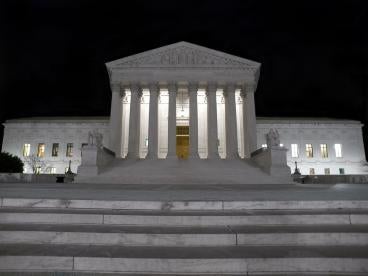Last week, the United States Supreme Court heard argument in State Farm Fire & Casualty Co. v. United States ex rel. Rigsby over the False Claim Act’s (FCA) “seal requirement.” The controversy highlights an important statutory tool for government contractors who face allegations of making false claims for payment. It also provides important lessons for those seeking to bring such allegations.
Under the FCA, a qui tam complaint must be filed under seal and remain under that seal for sixty days. 31 U.S.C. § 3730(b)(2). During those sixty days, the Government can intervene in the case or request an extension of time. Meanwhile, the plaintiff may not disclose the existence of the suit to the public.
Lower courts are divided about how to penalize a plaintiff who discloses allegations before the end of the seal period. The Sixth Circuit, for example, requires outright dismissal of FCA claims for any and all violations of the seal requirement. United States ex rel. Summers v. LHC Grp. Inc., 623 F.3d 287, 291 (6th Cir. 2010). Alternatively, the Second and Ninth Circuits impose a “balancing test” to determine whether dismissal is appropriate, typically taking into account: (1) the harm to the government; (2) the nature of the disclosure; (3) whether the disclosure was made in bad faith. United States ex rel. Lujan v. Hughes Aircraft Co., 67 F.3d 242, 245-47 (9th Cir. 1995); United States ex rel. Pilon v. Martin Marietta Corp., 60 F.3d 995, 997, 999-1000 (2d Cir. 1995).
In the case currently before the Supreme Court, plaintiffs Cori and Kerri Rigsby brought a qui tam complaint against State Farm Fire and Casualty Company (“State Farm”). The Rigsbys claimed that State Farm falsely classified wind damage caused by Hurricane Katrina as flood damage, so that the costs would be covered by the National Flood Insurance Program. Pursuant to the FCA, the Rigsbys filed their complaint under seal. However, shortly thereafter, the Rigsbys’ prior counsel allegedly disclosed the existence of the lawsuit to several news outlets. In response, State Farm moved for dismissal. The district court declined to dismiss the case, and the Fifth Circuit affirmed that decision. Applying a balancing test, the Fifth Circuit noted in particular that no news publications had reported the existence of the suit before the seal was partially lifted.
At oral argument, the Supreme Court considered whether to mandate dismissal for all violations of the seal requirement, or to apply a balancing test akin to the one employed by the Fifth Circuit. Several Justices appeared inclined to adopt a balancing test, but there was much discussion about what factors needed to be considered within that test. The Court weighed the merits of factoring in the plaintiff’s intent, the potential harm to the government that could result from “tipping off” the defendant to the suit, and the potential harm to the defendant that could result from releasing the information to the public without any advance notice or access to the complaint.
Regardless of how the Court decides the case, parties should be aware of the FCA’s seal requirement and its implications. Parties who wish to bring allegations of false claims should avoid disclosing the suit to the public, lest their case be dismissed. Contractors who learn through public sources that they are facing an FCA suit should consider seeking dismissal, and should potentially be prepared to discuss the harms they and the government incurred because of the disclosure. Watch this space in the next few months for analysis of the Court’s final opinion.





 i
i


